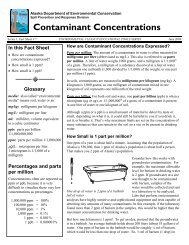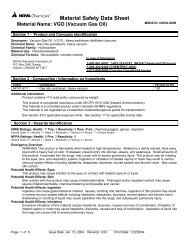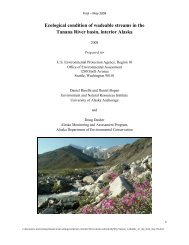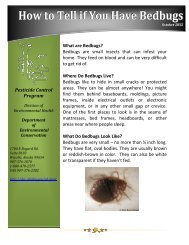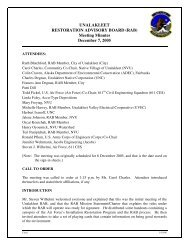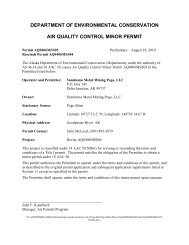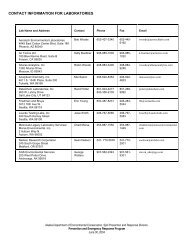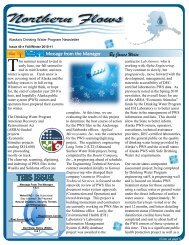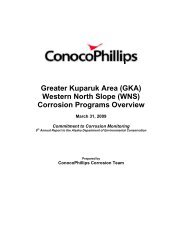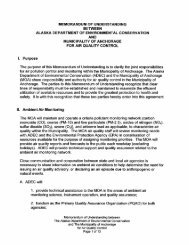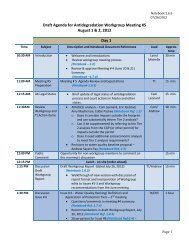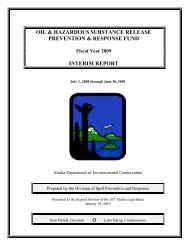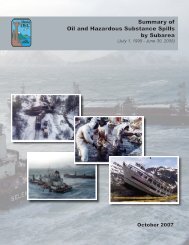2012 Ocean Ranger Guidebook Revision 3-7-12 - Alaska ...
2012 Ocean Ranger Guidebook Revision 3-7-12 - Alaska ...
2012 Ocean Ranger Guidebook Revision 3-7-12 - Alaska ...
Create successful ePaper yourself
Turn your PDF publications into a flip-book with our unique Google optimized e-Paper software.
<strong>20<strong>12</strong></strong> <strong>Ocean</strong> <strong>Ranger</strong> <strong>Guidebook</strong> 3-7-<strong>12</strong><br />
33 CFR 155.370 Oily mixture (bilge slops)/fuel oil tank ballast water discharges on oceangoing ships of 10,000 gross<br />
tons and above and oceangoing ships of 400 gross tons and above that carry ballast water in their fuel oil tanks.<br />
(a) No person may operate an oceangoing ship of 10,000 gross tons and above, or any oceangoing ship<br />
of 400 gross tons and above, that carries ballast water in its fuel oil tanks, unless it has—<br />
(1) Approved 15 ppm oily-water separating equipment for the processing of oily mixtures from<br />
bilges or fuel oil tank ballast;<br />
(2) A bilge alarm; and<br />
(3) A means for automatically stopping any discharge of oily mixture when the oil content in the<br />
effluent exceeds 15 ppm.<br />
(4) For equipment installed after 2004 to be approved under paragraph (a) of this section, it must<br />
meet current standards in 46 CFR part 162, subpart 162.050 by the date set forth in paragraphs<br />
(a)(4)(i) and (a)(4)(ii) of this section, unless the equipment is installed on a ship constructed<br />
before 2005 and it would be unreasonable or impracticable to meet those current standards.<br />
(i) A ship entering international service for the first time since 2004, must comply with the<br />
requirements of paragraph (a)(4) of this section by the date of its initial survey prior to<br />
receiving its International Oil Pollution Prevention (IOPP) certificate.<br />
(ii) Any ship, other than a ship described in paragraph (a)(4)(i) of this section, must<br />
comply with the requirements of paragraph (4) of this section by the date of the ship's first<br />
drydock after October 13, 2009.<br />
(b) No person may operate a ship under this section unless it is fitted with a tank or tanks of adequate<br />
capacity to receive the oil residue that cannot be dealt with otherwise.<br />
(1) In new ships such tanks shall be designed and constructed to facilitate cleaning and the<br />
discharge of the oil residue to reception facilities. Existing ships shall comply with this<br />
requirement as far as reasonable and practicable.<br />
(2) Tanks used for oily mixtures on ships certificated under 46 CFR Chapter I shall meet the<br />
requirements of 46 CFR 56.50-50(h) for isolation between oil and bilge systems.<br />
(c) No person may operate a ship under this section unless it is equipped with a pipeline to discharge oily<br />
mixtures to a reception facility.<br />
(d) This section does not apply to a barge that is not equipped with an installed bilge pumping system for<br />
discharge into the sea.<br />
(e) This section does not apply to a fixed or floating drilling rig or other platform, except as specified in §<br />
155.400(a)(2).<br />
33 CFR 155.380 Oily water separating equipment and bilge alarm approval standards.<br />
(a) On U.S. inspected ships, oily water separating equipment and bilge alarms must be approved under<br />
46 CFR 162.050.<br />
(b) On U.S. uninspected ships and foreign ships, oily water separating equipment and bilge alarms must<br />
be approved under either 46 CFR 162.050 or MARPOL 73/78 Annex I.<br />
201



